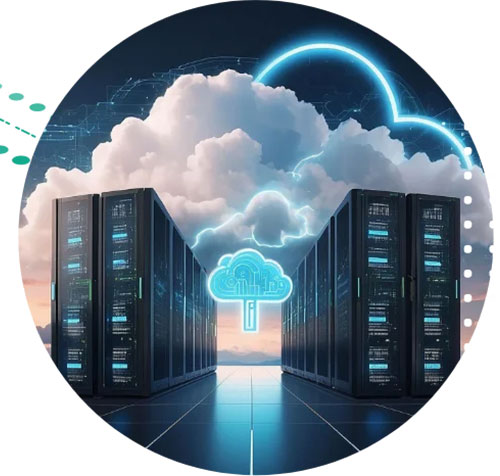Table of contents
Also referred to as an internal or corporate cloud, private cloud is a type of cloud computing environment where all resources i.e. hardware, software, and networks are strictly dedicated to only one organization. As compared to a public cloud model that shares its infrastructure across a number of users – private cloud extends a secure and customizable option that is tailored to meet the specific needs of the business.
In this article we will look into the features, benefits, and reasons why your business must adopt private cloud models.
What is a Private Cloud?
A private cloud is a cloud computing environment solely designed for a single organization. It is designed specifically for an organization, with all the hardware, software, and networking resources dedicated solely to that particular user or entity. This eliminates the possibility of shared infrastructure for other users. This means one gets full control over data, applications, and infrastructure.
Simply put, private cloud integrates the best of both worlds – the scalability, efficiency, and flexibility of cloud computing and the optimal security, control, and resource customization of on-prem IT infrastructure. Private cloud has emerged as an ideal choice for entities that handle sensitive workloads, such as those involving intellectual property (IP), confidential documents, or regulated data like financial information or medical records.
With 24×7 cloud experts and a state-of-the-art management system – Sify’s private cloud solutions that help reduce your total cost of ownership.
Key characteristics of private cloud include:
- Single-Tenant Environment: Resources are exclusively accessible to one organization.
- Customization: Customize the infrastructure according to your unique business needs.
- Improved Security: Run on a secure network, often behind corporate firewalls.
- Flexibility: You can adjust resources to match business needs.
Types of Private Cloud
- On-Premises Private Cloud
On-premise private clouds are hosted within the company’s data center and extend maximum control as they are managed by the organization’s IT team. However, these models require significant investment in both hardware and IT expertise.
Some factors to consider about on-premise private cloud infrastructure are:- High initial cost: On premise private clouds require considerable initial investment in licenses, infrastructure, hardware and software. Constant maintenance and upgrades may also prove to be expensive.
- More control: When compared to public cloud systems, private clouds offer more control and visibility into the infrastructure.
- Highest level of security: Yes, private cloud models give you the highest level of security as the control is within your organization.
- Scalability: On-prem private clouds are less scalable when compared to private clouds that are hosted by third parties.
- Virtual Private Cloud (VPC)
A virtual private cloud mimics the characteristics of a private cloud within a shared infrastructure.
Some of the key components of VPC include:- Internet gateways: Which allow traffic between instances in the VPC and the internet.
- Virtual private gateways: These gateways allow connectivity between VPC and on-premise networks through a VPN connection.
- VPC peering: These are private connections between two or more VPCs.
- NAT gateways: These facilitate instances in a private subnet to access the internet while blocking inbound internet traffic.
- Hosted Private Cloud
In the case of hosted private cloud models, third-party providers host the private cloud infrastructure in an offsite data center. This balances control with a reduced operational burden.
Key characteristics of hosted private cloud include:- An independent computing power: Hosted private clouds offer a separate computing power for a single organization.
- Quick entry point: Hosted private clouds offer an easy entry point, although at the cost of some control.
- Off-premises: Hosted private clouds operate on a third-party vendor’s cloud servers, that are located off-premises.
- Managed Private Cloud
In managed private cloud models, an external third party takes the responsibility of the cloud, freeing the entity’s IT team to focus on strategic efforts. Moreover, in this model a third-party provider hosts the private cloud infrastructure in an offsite data center, balancing control along with reduced operational burden.
Key characteristics of managed private cloud:- Security: Managed private clouds give higher security and privacy when compared to public cloud options. They can be designed to offer access only to approved users.
- Control: Managed private cloud owners have complete control over their cloud infrastructure, including software, hardware, and security.
- Cost: The cost of cloud computing can be managed by using cost optimization strategies for cloud configurations.
Benefits of Private Cloud for Your Business
- Greater Control
Private clouds offer a level of control that businesses have never had before. As opposed to public cloud environments, where resources are shared and managed outside, private clouds allow organizations to configure, monitor, and maintain their systems based on specific requirements. - Improved Security
As a model, private clouds run in isolated environments that ensure that confidential/sensitive data remains protected i.e. cannot be accessed by unauthorized people. Advanced security measures such as firewalls, intrusion detection systems, and encrypted communication channels are usually included in these environments. - Cost Efficiency in the Long Term
Although the initial investment to set up a private cloud is significant, the long-term savings are considerable. Private clouds do not charge subscription fees recurring based on usage like public clouds do. They also save a business money in terms of achieving cost efficiency in resource utilization and minimizing downtime, among other reasons, by cutting dependency on third-party services, with robust mechanisms for disaster recovery and redundancy.
Private Cloud vs. Public Cloud vs. Hybrid Cloud
To understand the importance and growing adoption of private cloud systems, it is important to understand where it stands when compared to other cloud models i.e. public cloud and hybrid cloud.
- Private Cloud
Pros:
Some of the distinctive advantages of private cloud include:- Offers high security since it operates in a dedicated, isolated environment.
- Fully customizable infrastructure to meet specific business and regulatory needs.
- Ideal for compliance with stringent standards.
Cons:
Some of the disadvantages of private clouds are:- High upfront investment in hardware and setup.
- Needs skilled IT staff to manage and maintain resources.
- Public Cloud
Pros:
The benefits of public cloud models include:- Highly cost-effective with pay-as-you-go pricing models.
- Scales seamlessly to deal with fluctuating workloads.
- No hardware maintenance is required because everything is handled by the provider.
Cons:
Disadvantages of public cloud models include:- Lack of controls over infrastructure and security settings.
- Resources are shared among multiple users, which may introduce performance variability.
- Hybrid Cloud
Pros:
Benefits of hybrid cloud models include:- Extremely cost-effective with pay-as-you-go pricing models.
- Scales effortlessly to handle fluctuating workloads.
- Eliminates the need for hardware maintenance, as everything is managed by the provider.
Cons:
Disadvantages of hybrid cloud are:- Limited control over infrastructure and security settings.
- Resources are shared among multiple users, which may introduce performance variability.
| Feature | Private Cloud | Public Cloud | Hybrid Cloud |
|---|---|---|---|
| Security | High | Moderate | High |
| Scalability | Moderate | High | High |
| Cost | High initially | Pay-as-you-go model | Varies |
| Customization | Full | Limited | Moderate |
A comparative analysis of private cloud vs public cloud vs hybrid cloud
Learn about Sify CloudInfinit solutions that provide next-gen enterprise-grade cloud infrastructure and managed offerings with automated intelligent operations, empowering companies to carry out businesses on a larger scale.
Challenges of Private Cloud
Private clouds offer a host of benefits but also come with drawbacks. These are important to note before making a decision.
- High Initial Costs
Setting up a private cloud environment requires significant initial setup investment. Organizations need to purchase and configure the hardware, that includes installing servers, and storage devices. In addition to this, other expenses include software license fees, virtualization tools, and management platforms. - Resource Management
Private cloud operation requires an expert team of IT professionals capable of handling complex infrastructure. Tasks like monitoring performance, maintaining uptime demand, and ensuring security full under their purview. Moreover, routine tasks such as managing backups, updating software and troubleshooting hardware issues can prove to be resource intensive. - Limited Scalability
Private clouds can be scaled to meet growing business needs, but the process is not as seamless as with public clouds. Expanding a private cloud often involves purchasing additional hardware, configuring new systems, and potentially upgrading the existing infrastructure. These steps can be time-consuming and costly.
Future of Private Cloud Computing
The future of private cloud computing is witnessing rapid change. Emerging technologies and evolving business needs will continue to mold the course. Here are some key trends and advancements that will redefine the private cloud landscape in the times to come:
- Integration of Artificial Intelligence (AI) and Machine Learning (ML): AI and ML are becoming essential tools in private cloud environments. These technologies enhance automation, making it possible to allocate resources more intelligently, optimize workloads, and perform predictive maintenance. For example, AI-led analytics can monitor cloud performance in real-time, identify inefficiencies, and suggest improvements to ensure seamless operations.
- Expansion of Edge Computing: The advent of edge computing has revolutionized how private clouds function. The concept of edge computing involves processing data closer to the source, thus reducing latency, enhancing the speeds of data processing, and supporting applications that require real-time decision-making, such as IoT and autonomous systems.
- Growing Importance of Hybrid and Multi-Cloud Strategies: Businesses’ increasing adoption of hybrid and multi-cloud models will push private clouds as a core to offer secure environments for sensitive workloads. Technologies, such as orchestration tools, unified management platforms will enable organizations to move workloads easily between environments so that the most efficient performance is realized at an optimal cost without non-compliance.
- AI-led Cloud Optimization: As AI continues to evolve, it will drive more sophisticated optimization of private cloud environments. AI algorithms will analyze usage patterns, predict resource needs, and automatically adjust configurations to enhance performance and reduce costs. This proactive approach will ensure that businesses derive maximum value from their private cloud investments.
In the times to come it will not just be a matter of upgrading existing capabilities but also about how private clouds will enable businesses to adapt to the rapidly changing digital landscape. Private clouds will continue to evolve as new technologies emerge and operational demands grow, providing a secure, scalable, and flexible foundation for innovation and success.The private cloud is a robust solution for businesses that want to have control, security, and customization in its IT environment. Though the initial investment is high, the long-term benefits outweigh the costs, thus making it worthwhile for organizations that handle sensitive data or require strict compliance.
Sify CloudInfinit offers a customizable multi-tier architecture that gives your organization a ready-to-use compute, network, storage, security, platform on a pay-per-use model. Learn more about it here































































